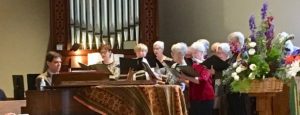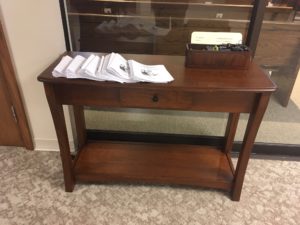Seventeenth Sunday after Pentecost
October 6, 2019
Good Shepherd Lutheran Church
Decorah, Iowa
Rev. Amy Zalk Larson
Click here to read scripture passages for the day.
Beloved of God, grace to you and peace in the name of Jesus.
Last Sunday we heard from a great hero of the Christian faith, Bishop Munib Younan. He has work- ed tirelessly for a just peace in the Holy Land and for interfaith understanding throughout the world. At times he’s risked his own life. Bishop Younan had just received the Pacem in Terris (Peace on Earth) Award, an honor that he shares with others like Dr. Martin Luther King, Jr., Mother Teresa, Desmond Tutu and the Dalai Lama. Yet at a luncheon last week, when that award was mentioned, Bishop Younan laughed it off and said something like, “I’m Lutheran we’re saved by grace. I don’t need an award.”
As I talked with the bishop at different gatherings last week, I was struck that he hasn’t set out to be a great and powerful man. He is simply a pastor who loves God and his people, who is doing what needs to be done to serve them. He isn’t seeking to have influence and power; he’s just doing his job.
Yet before I met Bishop Younan, I was a bit intimidated when I thought about spending time with such a heroic man. How have I contributed to peace and justice in the world? I probably felt a little like the disciples in our Gospel reading today when they plead with Jesus to increase their faith.
They feel inadequate in the face of what Jesus is asking of them – they want more faith, more power, more assurance that they can do this.
The problem is by quantifying faith, by begging for extra help to do what Jesus tells them to do, by fantasizing about some superpower that they don’t possess, they miss the point. Faith is not a sub- stance you can measure – it is someone you trust. And Jesus has told his disciples over and over: I’m right here, I’ve called you, I’m with you, you can trust me, you can trust God.
So, Jesus gets impatient with them and basically tells them: stop focusing on yourself and what you think you lack. Don’t expect more of some thing in order to do what I’m calling you to do. Get over yourself, look to God, you have all that you need.
You can trust God to do more in you than you can do on your own.
There’s also something lost in translation with Jesus’ words here. What he says is really more like: If you have faith the size of a mustard seed, and you know you do, you can work wonders. But then he continues: Don’t try to be amazing and work wonders and get all sorts of accolades – just do what needs to be done and be content with that.
OK, that’s not exactly what Jesus says. According to Luke, he says, “When you have done all that you were ordered to do, say … We are worthless slaves; we have done only what we ought to have done!”
I wish Jesus had used a different metaphor and been a little more kind, but he does give us some pretty freeing advice here. Don’t try to be more than you are, don’t do things expecting praise, don’t try to be amazing, just do your job and God will work in you as you do.
Our reading from 1 Timothy tells us that God has saved us and called us with a holy calling. God has given us each important callings. Our callings are to be workers, parents, spouses, friends, helpers, teachers and servants. As we live out our callings, God is working through us to love and heal the world.
This is important to remember in this time when there are so many challenges in our world. It can all be overwhelming and intimidating. We can start to feel like we need to be heroic to make any difference. Sometimes we feel if we can’t be like Bishop Younan or Greta Thunberg or Desmund Tutu, we shouldn’t even try.
But Jesus says just be who you are. Just do what is yours to do. Just get to work. This is all Bishop Younan does – he just seeks to do his job well. It is all any heroic person ever says. Staff Sergeant Salvatore Giunta, originally from Clinton, Iowa, is the first living recipient of the Medal of Honor from either the Iraq or Afghan wars. There’s a terrible story that led up to it, as is usually the case, but in reflecting on his actions SSG Giunta had this to say, “I didn’t run through fire to do any- thing heroic or brave; I did what I believe anyone would have done.” Heroes of most any kind usually echo that sentiment. “I was just doing my job.” “Anybody would have done it.” “I just did what I’m supposed to do.” That’s Jesus’ point: Just do what you’re supposed to do – you don’t need more faith, you just have to be who you are as God’s child and use the faith God has given you.
Just do your job. Care for your spouse, be kind to your kids, help your neighbor, listen to a co-worker who is down, bring soup for the October Fiesta, call your representative. In daily life, in the ordinary things, practice love and kindness and service. In these and so many other ways, you are doing what God has called you to do and you are bringing hope and love into our world.
You are a beloved child of God. You are enough.
You don’t have to do anything heroic, or grand, or flashy. Just do your job.
God will work through you.







